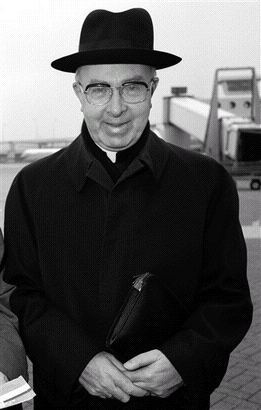Cardinal Johannes Willebrands: “The Vatican’s Flying Dutchman”

Cardinal Willebrands was one of the few select European Catholic theologians that guided or scuppered, whatever your point of view is, the future course of the Catholic Church taken during that period known as Vatican II.
As a protegee of the German Jesuit Cardinal Bea, he moved effortlessly in guiding and shaping the newly formed “Secretariat for Christian Unity” formed in the early 1960s. In fact, the Dutch bishops under Willebrands had started by initiating their own ecumenical conferences in the late 1940s and 50s. (Full details of these meetings were, it is reported, always relayed to Mgr. Bea, then Rector of the German Seminary in Rome, and also the confessor to the then Pope.)
So Willebrands had to be the natural cleric to head the new Vatican department to try and improve ecumenical relations between the Roman Catholic Church and other Christians during the years of Pope John XXIII (or as I remember them being called in a derogatory manner, “our separated brethren”) and of course this would have to naturally include the Jews. Later, of course, the Muslims and others would be approached and wooed to join and taste this Catholic curry available for all interested religions who ever cared to sit down and dine with them. And many did!
Interestingly enough it was Willebrands old boss (and Malachi Martin’s) Cardinal Bea who in November 1960 arranged for Dr. Geoffrey Fisher, the then Archbishop of Canterbury, to journey to Rome to meet and be the guest of Pope John XXIII. (Fisher was, of course, an English high ranking Freemason, which must have been known to the German Cardinal and to the Pope himself, who had flirted with other Middle Eastern cults during his tenure in Turkey as the Vatican Apostolic Delegate.)
This period of turbulent church history saw the enigmatic Willebrands crisscrossing the World on diplomatic church business: from Moscow (this at a time when serving clergy and laity of his church and others were being persecuted in the old Soviet Union, with many serving long prison sentences in the Gulags and psychiatric hospitals!) He would also fly to Calvin’s adopted Geneva and later to Athens then Alexandria and other likely cities that would aid the Vatican in its quest to control all Religions. (One has to speculate that when the false prophet arrives on the religious scene, perhaps in the very near future, so much of that organization will be up and running and ready and just waiting for him to come and reside in a religious precinct of theological prayers and take over.)
Willebrands certainly served his masters well; being later named “President of the Secretariat for Promoting Christian Unity” in 1969, the post he would serve in for almost 20 years. Later it would later be renamed “The Pontifical Council for Promoting Christian Unity” by Pope John Paul II in 1988.
(Who on earth dreams up these long-winded titles, I have to ask!)
Cardinal Willebrands was one of nine children born in the Netherlands. His father was an auctioneer/businessman (certainly angry pre-Vatican II Catholics would argue that the Cardinal had himself auctioned off or sold all the best parts of the Catholic church to assorted Communists, Freemasons and morally depraved enemy’s of the Church, that they claim took over the church after Vatican II and without a shot being fired!)
There is no doubt that Holland has always enjoyed a liberal attitude to life in both in church matters and civil ways. Willebrands was of course on the liberal wing of picked theologians who guided the Church through that period known as Vatican II along with Ratzinger, Rahner, Kung and others. With the death in 1964 of Cardinal Bea, the Pope appointed Willebrands to succeed him, and what better choice could there be many argued.
But always a Roman man he continued to serve in the capacity of consultant to the office of Christian Unity until his 80th birthday.
Even during the Papal election in 1978, he was a desirable candidate seen from the progressive wing of the church as a future Pope in the making. But that eventually went to the Cardinal from Venice who became late lamented John Paul I; of whose sudden death is still much debated in and out of church circles. (One witness recalls seeing the Dutch Cardinal saying to a nervous Luciana shortly before his election as the new Pope: “Courage.” One has to wonder if this was shot of “Dutch Courage” given to a man who would be dead in 33 days!)
But failing health finally caught up with the Dutch Prelate forcing him to retire in 1997 to Holland where it was announced yesterday that he had died at the age of 96.
GPB
August 4th 2006
(All Rights Reserved)